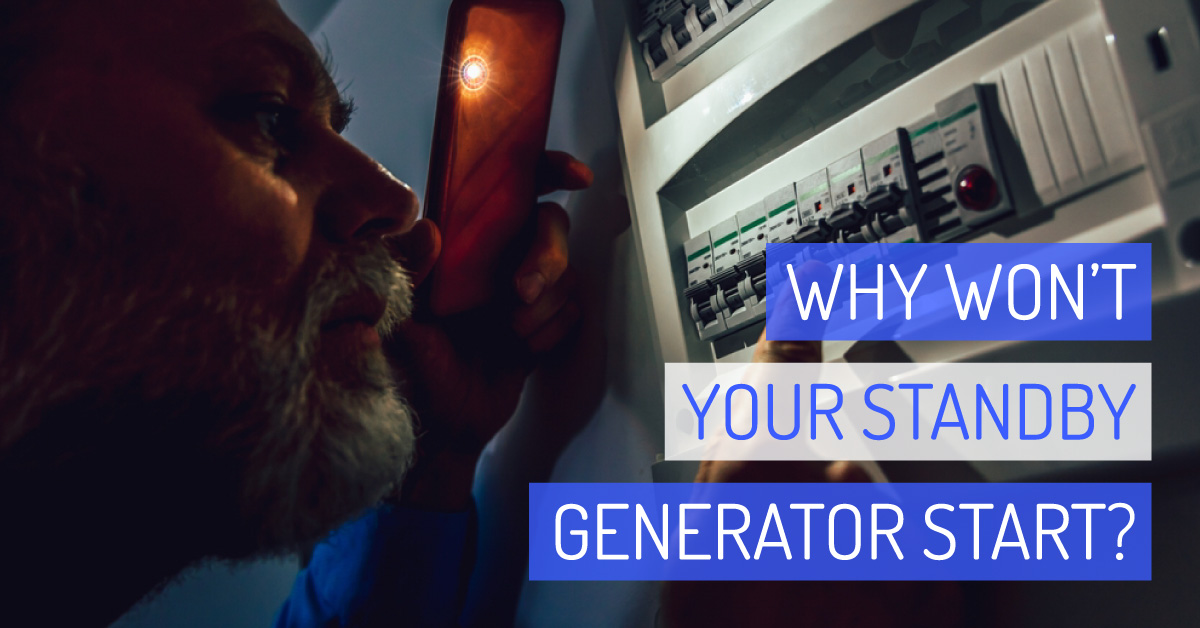A whole-house generator’s failure to start can be frustrating and concerning, and there are several common causes to consider. One frequent culprit is a lack of proper maintenance. Generators require regular servicing to ensure they remain in peak working condition.
Neglecting maintenance can result in issues with fuel delivery, clogged filters, worn-out spark plugs, and decreased battery efficiency, all of which can prevent the generator from starting when needed most. Routine inspections and maintenance by qualified professionals are essential to avoid these problems and ensure your generator operates reliably.
My Standby Generator Cranks (Turns Over) Normally but Will Not Start. What’s Wrong?
When your whole-house standby generator cranks but doesn’t start, several potential causes should be considered. One common reason is a fuel-related issue, such as insufficient fuel supply, a clogged fuel filter, or stale fuel. To address this, ensure the fuel tank is filled with clean, fresh fuel, and inspect and replace the fuel filter if necessary. Additionally, check the fuel shutoff valve, which may be closed or partially closed, restricting fuel flow to the engine.
Nick’s Generators Top Ten Reasons Your Generator May Not Start!
Generator starting issues can result from various factors, and troubleshooting them can often lead to relatively simple fixes. Here are the top 10 reasons a generator won’t start, along with common fixes for each:
- Issue: Dead Battery. A faulty or discharged battery is another common cause of a generator not starting. Many generators rely on batteries to initiate the starting process; over time, these batteries can lose their charge or develop issues. Extreme weather conditions, such as prolonged cold snaps, can affect battery performance.
Fix: Charge or replace the battery.
- Issue: Low Fuel Level. An empty fuel tank or inadequate fuel supply can prevent the generator from starting.
Fix: Refill the fuel tank and ensure it’s clean.
- Issue: Stale Fuel. Old or contaminated fuel can lead to starting issues.
Fix: Drain the fuel tank and replace it with fresh, clean fuel.
- Issue: Fuel Filter Clog. A clogged fuel filter can obstruct fuel flow to the engine.
Fix: Replace the fuel filter.
- Issue: Dirty Air Filter. A dirty or clogged air filter can impede airflow to the engine.
Fix: Clean or replace the air filter.
- Issue: Ignition System Problems. Another possible cause is a problem with the ignition system, such as a faulty spark plug or ignition coil. Worn or fouled spark plugs can hinder ignition, preventing the engine from starting.
Fix: Inspect the spark plugs; replace them if they appear damaged or worn. If the issue persists, consider having a professional technician diagnose and address the ignition system to ensure your generator starts reliably.
- Issue: Choke Position. Incorrect choke settings can affect starting.
Fix: Ensure the choke is in the proper position.
- Issue: Low Oil Level. Many generators have low-oil shutdown features.
Fix: Check and top up the oil level as needed.
- Issue: Overload Shutdown. Overloaded circuits can trigger a shutdown.
Fix: Reduce the load or redistribute it across multiple circuits.
- Issue: Maintenance Neglect. Lack of regular maintenance can result in various issues.
Fix: Schedule routine maintenance, including oil changes, filter replacements, and spark plug checks.
While these fixes address common starting problems, it’s essential to consult your generator’s manual for specific troubleshooting steps and to consider seeking professional assistance for more complex issues or if problems persist. Regular maintenance and timely troubleshooting can ensure your generator remains reliable when needed.
Call Nick’s First if You’re Experiencing Any of These Generator Issues.
Troubleshooting a standby generator can involve intricate systems, electrical components, fuel delivery, and more. While some issues may have straightforward solutions, others can be elusive and challenging to diagnose accurately. Factors like fuel quality, electrical connections, ignition systems, and even electronic controls can all contribute to generator problems. Identifying and repairing these issues without the necessary expertise and equipment can lead to further damage, safety risks, and costly mistakes.
Given the intricacies of generator systems, it’s often best to leave diagnosis and generator repair to qualified professionals. Companies like Nick’s Generators of Houston have the experience and knowledge to troubleshoot and address generator issues effectively. Their technicians can perform comprehensive inspections, use specialized diagnostic tools, and apply their expertise to identify the root causes of problems.
By entrusting your generator to professionals, you ensure its reliable performance and enhance your safety and peace of mind, knowing that your backup power source is in capable hands.
Call Nick’s Today, We’re on the Way!

